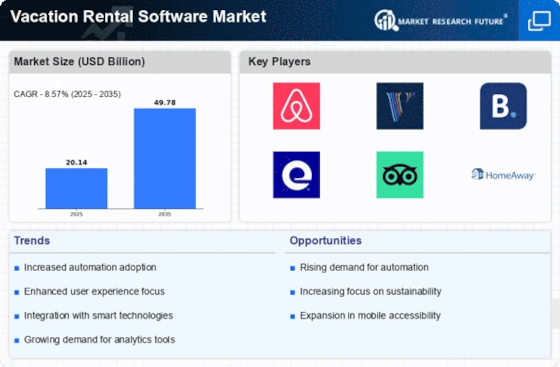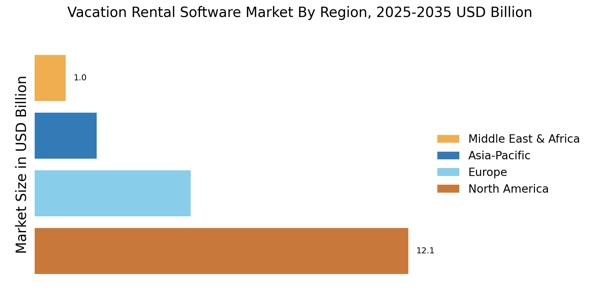Rise in Short-Term Rentals
The increasing popularity of short-term rentals is a primary driver for the Vacation Rental Software Market. As travelers seek unique and personalized experiences, property owners are turning to vacation rentals as a lucrative alternative to traditional lodging. According to recent data, the short-term rental market has seen a substantial growth rate, with projections indicating a continued upward trajectory. This trend compels property managers to adopt sophisticated software solutions that streamline operations, enhance guest experiences, and optimize pricing strategies. Consequently, the demand for vacation rental software is likely to surge as property owners and managers strive to remain competitive in a rapidly evolving market.
Emphasis on Enhanced Guest Experience
The emphasis on providing an enhanced guest experience is a pivotal driver for the Vacation Rental Software Market. As travelers increasingly seek personalized and memorable stays, property owners are leveraging software solutions to tailor their offerings. Data shows that properties equipped with technology that facilitates personalized communication and customized services tend to receive higher guest satisfaction ratings. This trend encourages property managers to invest in software that enables them to engage with guests effectively, from pre-arrival communication to post-stay follow-ups. Consequently, the focus on guest experience is likely to propel the growth of vacation rental software, as it becomes integral to attracting and retaining customers.
Integration of Advanced Payment Solutions
The integration of advanced payment solutions is a crucial factor influencing the Vacation Rental Software Market. As the landscape of online transactions evolves, property managers are increasingly adopting software that supports diverse payment methods, including digital wallets and cryptocurrencies. This shift is driven by consumer preferences for secure and flexible payment options. Data indicates that a growing number of travelers are willing to pay a premium for properties that offer modern payment solutions. Consequently, vacation rental software that incorporates these features is likely to gain traction, as it not only enhances the booking experience but also reduces transaction-related friction for both guests and property owners.
Growing Demand for Seamless Booking Experiences
The demand for seamless booking experiences is reshaping the Vacation Rental Software Market. As consumers increasingly prioritize convenience, software solutions that facilitate easy booking processes are becoming essential. Recent statistics suggest that a significant percentage of travelers prefer platforms that offer instant booking capabilities, flexible payment options, and user-friendly interfaces. This trend drives software developers to innovate and enhance their offerings, ensuring that property managers can provide a frictionless experience for guests. The emphasis on user experience not only attracts more bookings but also fosters customer loyalty, further propelling the growth of the vacation rental software sector.
Increased Focus on Property Management Efficiency
The need for enhanced property management efficiency is a significant driver in the Vacation Rental Software Market. As competition intensifies, property managers are seeking software solutions that streamline operations, from booking management to maintenance tracking. Recent findings suggest that property managers who utilize comprehensive software solutions experience improved operational efficiency and reduced overhead costs. This trend highlights the importance of adopting technology that automates routine tasks, allowing managers to focus on strategic growth initiatives. As a result, the demand for vacation rental software that offers robust property management features is expected to rise, reflecting the industry's shift towards operational excellence.

















